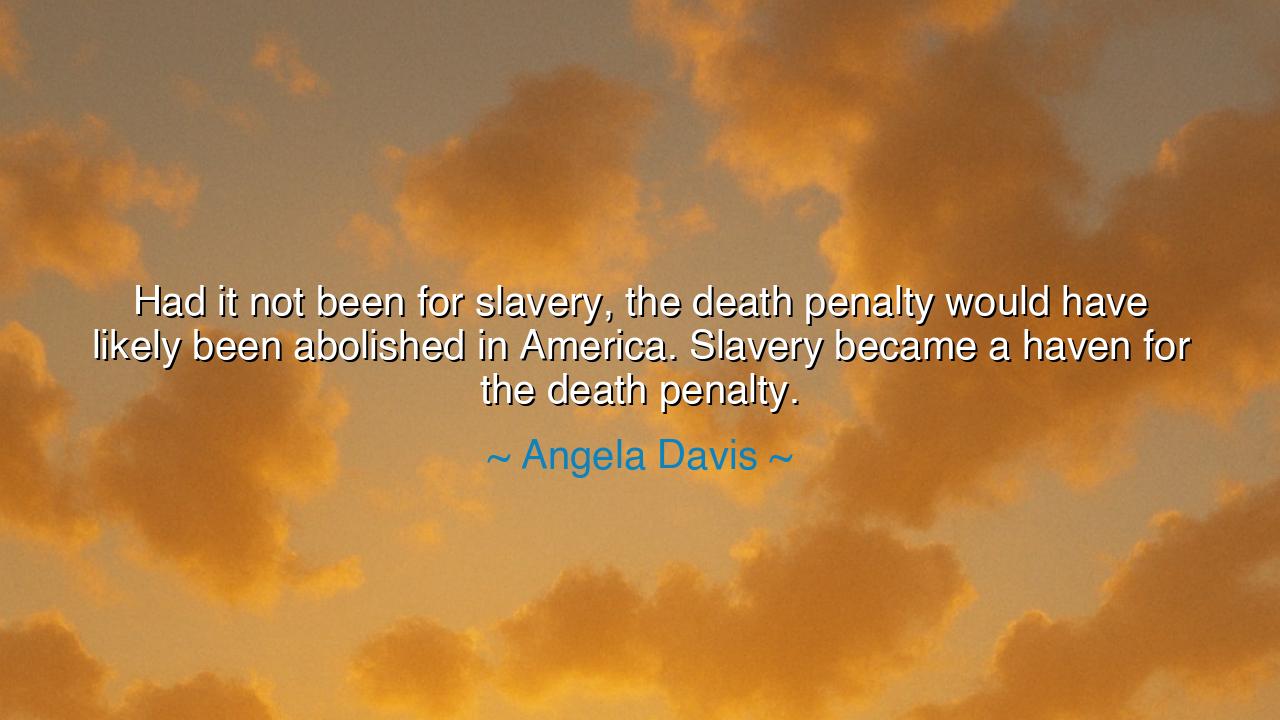
Had it not been for slavery, the death penalty would have likely
Had it not been for slavery, the death penalty would have likely been abolished in America. Slavery became a haven for the death penalty.






“Had it not been for slavery, the death penalty would have likely been abolished in America. Slavery became a haven for the death penalty.” These words of Angela Davis, the scholar and revolutionary, fall upon the conscience like the tolling of a heavy bell — ancient, mournful, and unflinchingly true. In this statement, she does not merely condemn a system of punishment; she reveals the deep and poisonous root from which it grew. For in the soil of slavery, watered by blood and cruelty, the idea of state-sanctioned death found shelter, and from that haven, it spread through the centuries, changing form but never its nature.
To understand her words is to trace the shadow of injustice that stretches from the slave plantations of the American South to the prison cells of the modern era. Before slavery, in many parts of the world, the death penalty was being questioned, softened, and in some places abolished. Enlightenment thinkers in Europe spoke of reason, humanity, and the value of mercy. But in the young United States, as the wealth of the nation grew upon the backs of enslaved people, the power to destroy life became a tool not of justice, but of domination. The lash and the noose were instruments of order — not divine order, but the order of fear. And so, as Davis declares, slavery became the haven, the sanctuary where execution was not only tolerated but sanctified.
During the centuries of bondage, death was the overseer’s companion. Enslaved men and women were hanged for rebellion, whipped to death for disobedience, and murdered without consequence for the crime of seeking freedom. Their deaths were made public to teach submission, their pain turned into spectacle. And even after the chains were broken, the spirit of that cruelty endured. The lynching tree replaced the auction block; the execution chamber replaced the plantation gallows. What was once done by masters in the name of property was now done by the state in the name of law. Thus, the death penalty became the silent heir of slavery — a relic clothed in legal robes, preserving the same logic of racial terror beneath its surface.
Consider the story of George Stinney Jr., a Black boy of only fourteen, executed in South Carolina in 1944. He was accused, without evidence, of killing two white girls. His trial lasted barely two hours, the jury deliberated for ten minutes, and he was sent to the electric chair — so small that he had to sit on a Bible to reach the apparatus. Decades later, he was declared innocent. But the machinery of death, once set in motion, could not be undone. His story is not an isolated tragedy; it is the echo of centuries of systemic cruelty that Angela Davis sought to name — the same current of violence that flowed unbroken from the whip to the gavel, from the master’s field to the prison cell.
In the wisdom of the ancients, there was always a reckoning between justice and vengeance. The Greek tragedians wrote of kings who destroyed themselves by mistaking retribution for righteousness. So too, America has long walked that narrow path, mistaking death for justice, control for peace. Davis’s words urge us to see that this is not coincidence — it is heritage. The persistence of the death penalty in the United States is not a sign of moral strength, but of a wound unhealed, a legacy of slavery unrepented. The nation carries in its laws the ghosts of its past, and those ghosts demand to be acknowledged.
The lesson, then, is not only for judges and lawmakers, but for all who inherit this age. To abolish injustice, one must tear it out by the root — not only reforming systems, but reckoning with history. For if the death penalty found its home in the house of slavery, then its abolition must begin with truth, with repentance, with the courage to confront the foundations of cruelty upon which so much was built. The path to mercy is not found through denial, but through remembrance.
And so, let the people of conscience rise as in the days of the prophets. Let them speak not in whispers but with fire. Let them declare that a nation cannot call itself free while it clings to the instruments of oppression inherited from its darkest age. Angela Davis’s words are not an accusation — they are a summons. They remind us that to build a just world, we must first purify the soul of our societies. And until the day when no state bears the right to kill, until every remnant of slavery’s shadow is dispelled by the light of compassion, the work of justice — the true, eternal work — remains unfinished.






AAdministratorAdministrator
Welcome, honored guests. Please leave a comment, we will respond soon